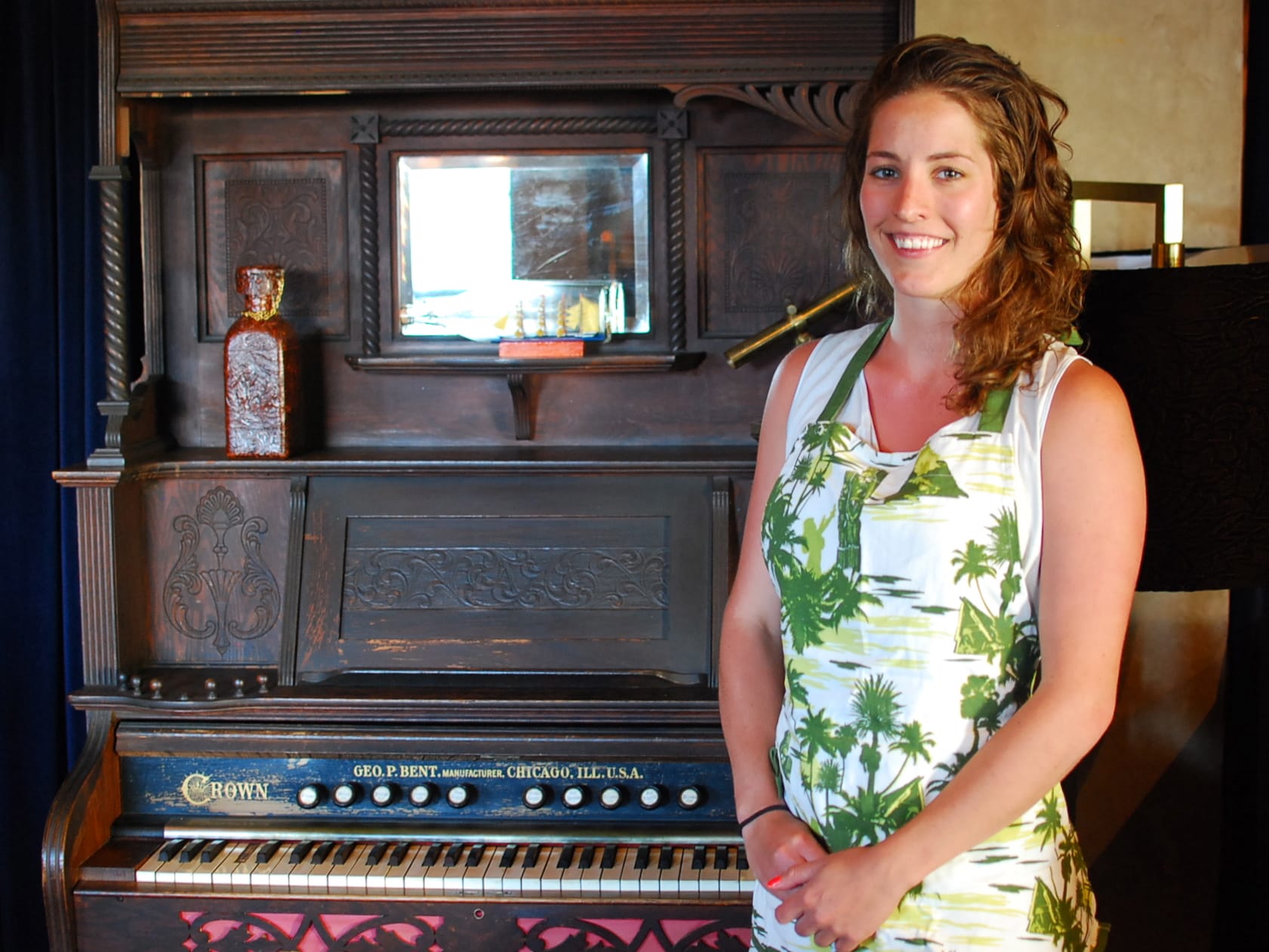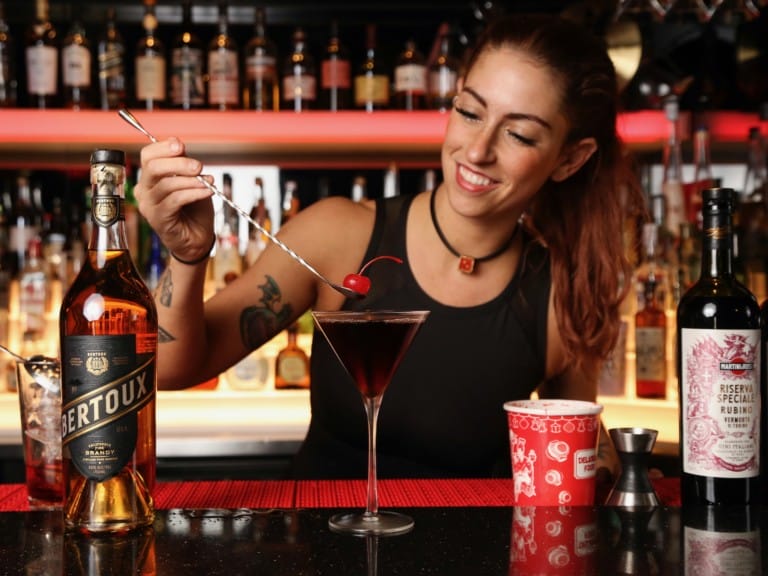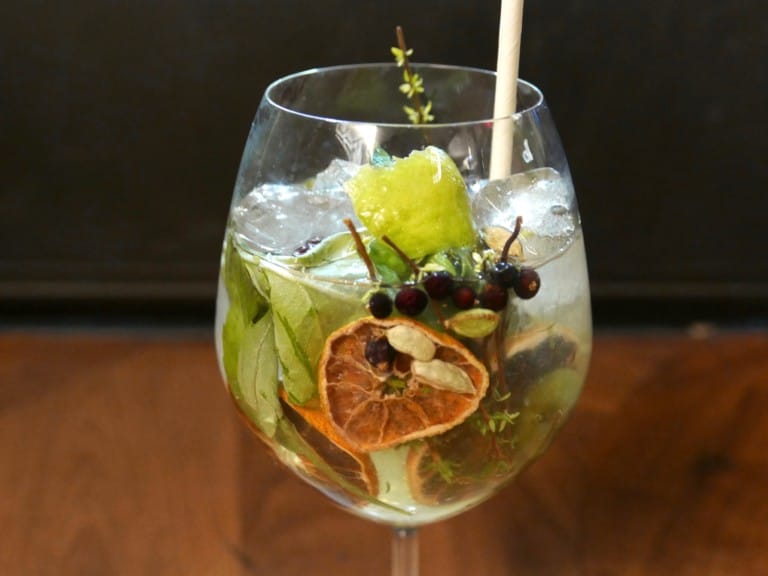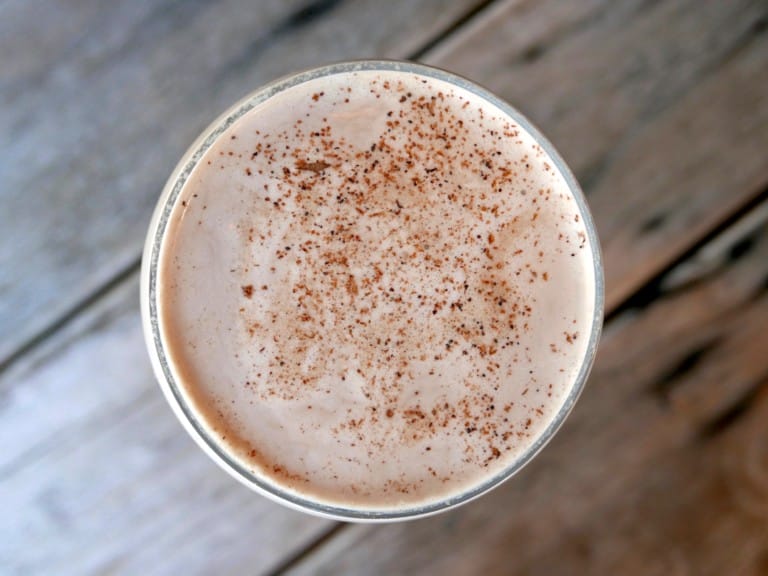INTERVIEW CONTINUED FROM PREVIOUS PAGE
How did the Clover Club opportunity come about?
That’s also a good question. I started working with Julie Reiner, and how that started to happen was – like I said, I’d been bartending for years and got this cocktail job at Mayahuel – and realized pretty much after a few days that I wanted to be bartending again. And then I went around New York trying to get jobs. It was not the easiest thing, at all. I also started this thing called Speed Rack, and one of the reasons I started it was because the acceptance of, “I want to be a bartender.” “Nah, you’re really more of a cocktail waitress.” “No, actually, I want to learn more because I’m a creative person, and I want to create the drinks, not just talk about them and sell them on the floor.” So what happened was Julie Reiner was opening up Lani Kai, in SoHo, in Manhattan, and I knew my boss Phil Ward at Mayahuel worked for her at Flatiron, and because it’s a small scene in L.A. – just like New York – we all know each other. I wrote her an e-mail, “Julie, you’re opening up Lani Kai. I would really like to get a position there. I really want to work for you.” She’s obviously a luminary in this industry. She wrote me back, “Yeah, come in for an interview.” So I came in and she’s still open – it’s on Broome Street in SoHo – it’s a huge space. There’s an upstairs, downstairs, three-and-a-half wells. She says, “Why do you want to work here?” I tell her, “I really want to work for you.” At that point, I had very little knowledge of rum and Tiki. Lani Kai’s not a Tiki joint, per se. She says it’s “Hawaiian tropical,” but it’s Tiki influenced. There’s lots of flowers, lots of beauty. So she hired me at Lani Kai. I was on the opening staff. I worked there for a year. Her and I became very close. She definitely helped me out, doing things. Like starting Speed Rack, she judged a lot of the competitions. And after working at Lani Kai – I think I had been working there for five or six months or something – a spot opened up at Clover Club and she called me, I think it was on Thanksgiving day. She called me at my home in Vermont. It was definitely a holiday. And she called me at my home in Vermont, because there’s no cell service up there, and I thought something really bad had happened. Like, “Oh, my god, Julie’s calling me at my home. What the hell’s going on? I don’t even know how she got my number. She said, “Listen, we had a dropout. I need you to start training the next day. I was like, “Alright, I’ll come home.” Clover Club is one of the pinnacles to work at in New York. Just for the Spirited Awards that came out, Clover Club made the shortlist, the top four for Best American Cocktail Bar, Best High Volume Cocktail Bar, and Best Cocktail List. It’s just great. I’ve been working there for a little over a year, but I got there because of my route through Lani Kai.
Would you consider Julie a primary mentor?
Yes. The first person that actually hired me as a bartender – it’s hard, it’s almost a Catch-22, when you want to become a bartender – because you may know a lot, but if you’ve never worked anywhere, people are like, “Mmm, maybe, but you need to work somewhere, and when you work somewhere, then you can’t go anywhere else.” This whole thing. St. John Frizell at Fort Defiance in Red Hook, Brooklyn, he was actually the one that hired me. He was like, “You know what. You might not have that much cocktail bartending experience, but you bartended for five years and you have a lot of spirits knowledge, so yes, I’m going to let you do what you do.” I worked at Fort Defiance – which is an amazing little place in Red Hook, Brooklyn – I worked there off and on for a year and a half, and I really got to develop a personal style there, that was really unique. Because St. John mentored me. He helped me along the way, but I pretty much got to do whatever I wanted. And I learned a lot. He’d give me books to read. Great. I’d say St. John and Julie, together, for them both giving me the chance and then helping me along the way. Julie helped promote me and what I do.
What’s your favorite part about bartending?
I would say still is the hospitality aspect of it all. The whole making drinks, being creative, is a very important thing to me, but that’s very internalized. I think about all those things and I keep them very separate. Like the thing I said about making cocktails with spirits from places that might have some kind of historical combat, I don’t say that to anyone, usually. It’d be like, “So, this drink is super nerdy, and let me tell you why.” I do like making very tasty things, which is obviously the byproduct of this dorky crusade that I went on, but I think the greatest thing is being behind a piece of wood or marble or what have you, and having people come to you, and it’s like, “I’m going to put myself in your hands. Let me experience this thing that you’re going to do for me.” Not that everybody is like that. I would say on a good day, 1 out of 5 people will be like that. Probably more like 1 out of 10, but those people really make it worth it. Those people really want to be there, and the bartender is like the orchestrator of the room. I get to orchestrate what someone tastes. You tell me what you like. Like vodka. “I want a vodka soda.” Well, are you married to that idea or can I teach you about something else? And if I can teach you about something else, convert a vodka soda drinker into a Pisco Sour drinker. And get them into a different spirit or just in a different direction, that’s a win for the night. So I can orchestrate not just what they’re experiencing with their mouth, and what they’re tasting, and maybe improving their education on something, but I also get to orchestrate the entire ambiance of the room. I can change that song. I can up the tempo. I can be as involved or not as involved as I want to with the people around me. And I can make their night a good night or a bad night. It’s pretty much all up to me. It’s a high pressure, but I enjoy that. I think that’s the greatest part of the job. Going in and knowing you can create a memory for someone every single night is great. It’s good.
People are also probably more trusting at a place like Clover Club, too.
Yeah, you get people who come in with cocktail books, like the Savoy. They’ll be flipping through and they’ll be like, “Do you know how to make this, whatever, X, Y or Z?” And you’ll be like, “Umm, yes, I think so.” We all try to be an encyclopedia of drinks, and we all have a dictionary back here so we can look it up. I had this guy who came on a Friday night to the service well, totally weeded – it’s a big place and when you’re in service well, we’ve got all these tickets up and we’ve got 30 drinks on our menu – this guy’s like, “Can you get me an Abner Rose #2?” I’m like, “Sure, yeah.” He’s like, “Do you know how to make it?” “Yes,” and in my head I know exactly how to make it, Scotch and Peychaud with honey and cream on top. I don’t remember how this drink is made. “No, I don’t, but could you read me the recipe?” He shuts the book and says, “You’re supposed to know how to make these things.” “It’s a Friday night and I’ve got 13 tickets right there. Are you doing this to me right now?” Mostly people are understanding.
What’s the biggest challenge about bartending?
There are massive challenges. The #1 – and I said this a little while ago to someone also – bartending, you get to orchestrate people’s nights. You can make it a good one or a bad one. Sometimes that’s just impossible. Not only can you see people at their very best, but you can also see people at their very worst. Alcohol makes people work in extremes, and it’s a bummer to see people at their very worst, either they’re totally sad or depressed, or obnoxious and annoying. It’s sad to see that sometimes. We’ve just got to remember, or try as hard as you can, that this is not this person 100% of the time. And you can try to help them out. “Hey, let me talk to you and see what your problem is,” but sometimes there’s nothing you can do, and just because they’re that way isn’t your fault. That’s one aspect of it. That’s an emotional aspect of it.
It’s a very physically demanding job. I spend a great deal of my earnings on chiropractic work and massages. It’s tough. I’m not old. I’m 26 years old, and I spend a great deal of money trying to fix my body, because it’s such a demanding job. I’d say those two things.
How do you find balance in your life, considering those demands?
INTERVIEW CONTINUED ON NEXT PAGE









Leave a Comment